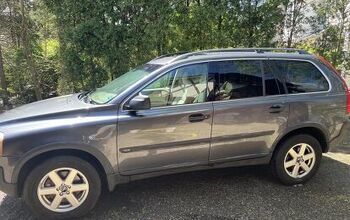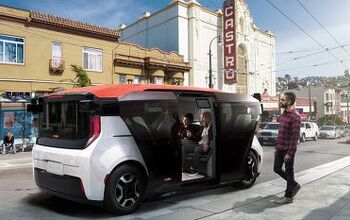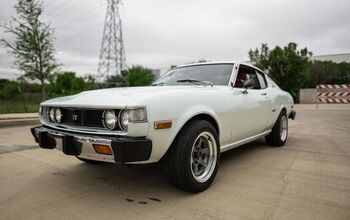Sergio Waits by the Dream Phone After VW Boss' Remarks

Sergio’s waiting by the phone. Waiting for someone to call him up and tell him he’s not alone. (Our apologies to Soul Asylum – Ed.)
It’s not our fault Fiat Chrysler Automobiles CEO Sergio Marchionne’s corporate life resembles a game of Mystery Date. That’s just the way it is for an automaker on the prowl for a partner. After having its advances repeatedly rebuffed by General Motors, FCA has now latched onto Volkswagen as a potential suitor — but the merger dance hasn’t been a smooth one.
After some cattiness on VW’s part, it seems the eternally — and perhaps naïvely — optimistic Marchionne’s hopes are once again up. He’s anticipating a call.
“We are waiting with anticipation,” Marchionne told reporters today, according to Reuters.
It seems that Marchionne could be reading too much into comments made by Volkswagen Group CEO Matthias Müller last week. Still, stranger things have happened. Perhaps Müller is being coy with his true intentions, playing hard to get to keep up appearances. What is certain is this past month’s weird non-courtship between FCA and VW has played out in a very rocky “Becky told me something after science class” kind of way.
After telling reporters, “I have no doubt that at the relevant time VW may show up and have a chat,” Marchionne’s advance met a cold shoulder. “We have other problems,” the VW CEO said when questioned, clearly not interested in a first date, let alone a marriage.
Both automakers face a number of issues.
VW, after taking a huge financial hit from the diesel emissions scandal, is desperately seeking to flesh out its U.S. utility vehicle lineup.
FCA, on the other hand, has struggled to wrestle down longstanding debt. Some brands, like Chrysler and Dodge, are lagging, while all available cash has been funneled towards to developing new utilities vehicles and trucks. Also, there’s still no takers on FCA’s goal of partnering up to build cheap compact cars in Mexico or elsewhere.
Last week, VW was suddenly in the mood to downplay its comments. On the topic of merger talks, Müller claimed, “I have never said I would exclude it.” (Company) size doesn’t matter to him, he added. Still, the German executive voiced his wish that his would-be Italian flame not go running to the media every time he has a thought. The media trumpeted that comment as an open line to VW HQ, and not as the backhanded remark in which Müller intended it.
Still, Marchionne may just take up that invitation. After explaining he expected the phone to ring at any time, the CEO said, “I haven’t seen Müller in 6-7 months, but I will go find him at the first opportunity.”
To be a fly on the wall of that meeting…
[Image: Fiat Chrysler Automobiles]

More by Steph Willems
Latest Car Reviews
Read moreLatest Product Reviews
Read moreRecent Comments
- W Conrad I'm not afraid of them, but they aren't needed for everyone or everywhere. Long haul and highway driving sure, but in the city, nope.
- Jalop1991 In a manner similar to PHEV being the correct answer, I declare RPVs to be the correct answer here.We're doing it with certain aircraft; why not with cars on the ground, using hardware and tools like Telsa's "FSD" or GM's "SuperCruise" as the base?Take the local Uber driver out of the car, and put him in a professional centralized environment from where he drives me around. The system and the individual car can have awareness as well as gates, but he's responsible for the driving.Put the tech into my car, and let me buy it as needed. I need someone else to drive me home; hit the button and voila, I've hired a driver for the moment. I don't want to drive 11 hours to my vacation spot; hire the remote pilot for that. When I get there, I have my car and he's still at his normal location, piloting cars for other people.The system would allow for driver rest period, like what's required for truckers, so I might end up with multiple people driving me to the coast. I don't care. And they don't have to be physically with me, therefore they can be way cheaper.Charge taxi-type per-mile rates. For long drives, offer per-trip rates. Offer subscriptions, including miles/hours. Whatever.(And for grins, dress the remote pilots all as Johnnie.)Start this out with big rigs. Take the trucker away from the long haul driving, and let him be there for emergencies and the short haul parts of the trip.And in a manner similar to PHEVs being discredited, I fully expect to be razzed for this brilliant idea (not unlike how Alan Kay wasn't recognized until many many years later for his Dynabook vision).
- B-BodyBuick84 Not afraid of AV's as I highly doubt they will ever be %100 viable for our roads. Stop-and-go downtown city or rush hour highway traffic? I can see that, but otherwise there's simply too many variables. Bad weather conditions, faded road lines or markings, reflective surfaces with glare, etc. There's also the issue of cultural norms. About a decade ago there was actually an online test called 'The Morality Machine' one could do online where you were in control of an AV and choose what action to take when a crash was inevitable. I think something like 2.5 million people across the world participated? For example, do you hit and most likely kill the elderly couple strolling across the crosswalk or crash the vehicle into a cement barrier and almost certainly cause the death of the vehicle occupants? What if it's a parent and child? In N. America 98% of people choose to hit the elderly couple and save themselves while in Asia, the exact opposite happened where 98% choose to hit the parent and child. Why? Cultural differences. Asia puts a lot of emphasis on respecting their elderly while N. America has a culture of 'save/ protect the children'. Are these AV's going to respect that culture? Is a VW Jetta or Buick Envision AV going to have different programming depending on whether it's sold in Canada or Taiwan? how's that going to effect legislation and legal battles when a crash inevitibly does happen? These are the true barriers to mass AV adoption, and in the 10 years since that test came out, there has been zero answers or progress on this matter. So no, I'm not afraid of AV's simply because with the exception of a few specific situations, most avenues are going to prove to be a dead-end for automakers.
- Mike Bradley Autonomous cars were developed in Silicon Valley. For new products there, the standard business plan is to put a barely-functioning product on the market right away and wait for the early-adopter customers to find the flaws. That's exactly what's happened. Detroit's plan is pretty much the opposite, but Detroit isn't developing this product. That's why dealers, for instance, haven't been trained in the cars.
- Dartman https://apnews.com/article/artificial-intelligence-fighter-jets-air-force-6a1100c96a73ca9b7f41cbd6a2753fdaAutonomous/Ai is here now. The question is implementation and acceptance.


































Comments
Join the conversation
I think this deal will happen. VW has been weaken led by dieselgate and is not strong in the US. They also have said in the past that they want Alfa. Alfa would easily integrate into Audi and could share lots of parts. Jeep and Ram would be great catches for VW. Chrysler could rebadge most of the SEAT/ Skoda Range and enjoy enough success to make it worthwhile. That leaves Fiat which is strong in Italy and Latin America. The simple solution might be to pull Seat out of markets where Fiat is stronger and then simply make Fiat what Vauxhall is to Opel. VW is also weak in the Dacia type of market and India but I guess that's why they have just agreed a partnership with TATA Motors. Maybe they are thinking of another acquisition at a later date...
Why? So the Chrysler group can financially destroy other companies by putting out junk that nobody but patriotic lunatics want to buy? If VW were smart, they wouldn't give them a second look as they don't need any more financial burdon. Daimler kept them on life support for a decade and all it did was contribute to Mercedes-Benz's darker days, of rusty, problematic cars. If it were me, I'd close down Dodge and Chrysler, sell Jeep to GM or Ford (assuming they'd want that garbage to add to their own portfolios of horribly built cars), and sell FCA's italian arm of Fiat, Alfa Romeo, Maserati, and Ferrari, to a Chinese owner like Geely or Indian owner like TATA. Those two companies have done wonders for Volvo and Jaguar/Land Rover respectively. I swear, the Detroit auto industry is going to hell in a handbasket. First with GM pulling out of the European market, and now with FCA wanting to merge with another company. These companies are in HUGE trouble.